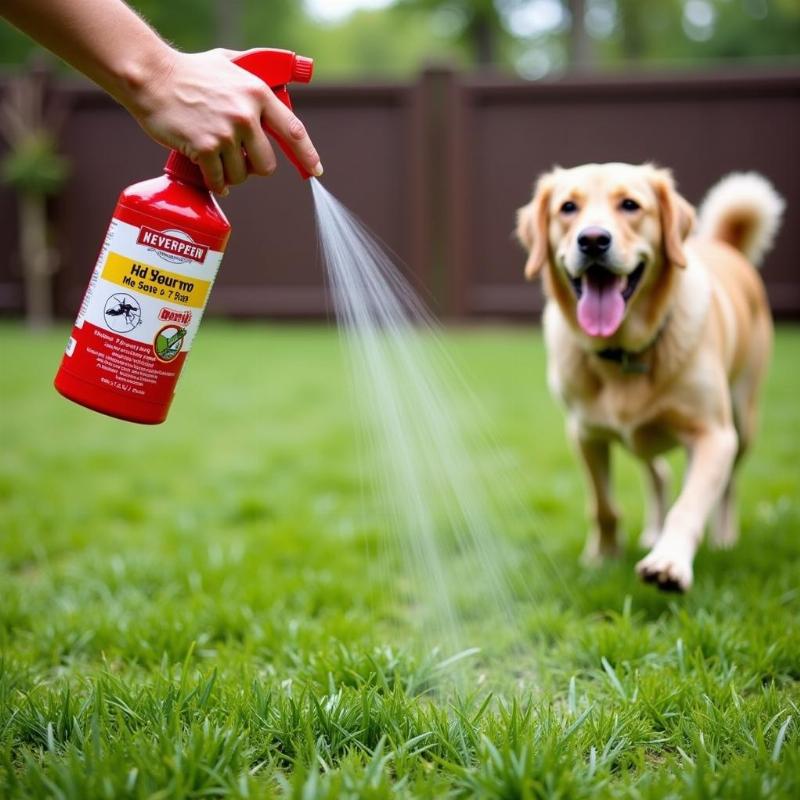Mosquitoes are a nuisance for everyone, including our beloved canine companions. Beyond itchy bites, these pesky insects can transmit heartworm disease, a serious and potentially fatal condition for dogs. Therefore, finding a dog safe mosquito yard spray is crucial for responsible pet owners in the United States. This article will explore various options available, discuss important safety considerations, and guide you toward creating a mosquito-free environment where your dog can play and relax without worry.
Choosing the Right Dog Safe Mosquito Yard Spray
When selecting a mosquito yard spray, safety for your dog should be your top priority. Look for products specifically labeled as safe for pets and follow the instructions carefully. Avoid products containing DEET, as this chemical can be toxic to dogs if ingested or absorbed through the skin. Instead, opt for natural repellents like citronella, lemongrass, and cedarwood. These essential oils are effective at deterring mosquitoes and pose minimal risk to your furry friend. Always consult with your veterinarian before using any new product on your dog or in their environment.
 Applying Dog-Safe Mosquito Yard Spray
Applying Dog-Safe Mosquito Yard Spray
DIY Dog Safe Mosquito Yard Spray Recipes
For pet owners who prefer a more natural approach, creating a homemade mosquito yard spray is a viable option. Several simple and effective recipes utilize common household ingredients. For example, a mixture of apple cider vinegar, water, and a few drops of dog-safe essential oils can be an effective deterrent. Another option is to brew a strong batch of garlic tea and spray it around your yard. While the scent may be strong to us, it’s generally safe for dogs and helps repel mosquitoes.
Other Mosquito Control Methods for a Dog-Friendly Yard
Besides sprays, various other methods can help control mosquitoes and protect your dog. Eliminating standing water is crucial, as it serves as a breeding ground for mosquitoes. Regularly empty any containers, birdbaths, or puddles around your yard. Installing mosquito netting around patios and decks can provide a physical barrier against these insects. Planting mosquito-repelling plants like lavender, marigolds, and rosemary can also contribute to a mosquito-free environment.
Protecting Your Dog from Mosquito Bites Beyond the Yard
While creating a mosquito-free yard is essential, protecting your dog from mosquito bites during walks and outdoor adventures is equally important. Consider using a dog-safe mosquito repellent spray directly on your dog’s fur, avoiding the face and eyes. Mosquito repellent collars are another option, but ensure they are made from natural ingredients and fit your dog comfortably. During peak mosquito hours, try to limit your dog’s exposure by staying indoors or choosing shaded areas for walks. Remember, preventing mosquito bites is the best way to protect your dog from heartworm disease.
Conclusion
Protecting your furry friend from mosquitoes is a vital part of responsible dog ownership. By choosing a dog safe mosquito yard spray and implementing other preventive measures, you can create a safe and enjoyable environment where your dog can thrive. Remember to prioritize natural ingredients, consult with your veterinarian, and remain vigilant in eliminating mosquito breeding grounds. By taking these steps, you can ensure your dog stays healthy, happy, and mosquito-bite free.
FAQ
- What are the signs of heartworm disease in dogs? Signs can include coughing, fatigue, difficulty breathing, and weight loss.
- How often should I apply dog safe mosquito yard spray? Follow the product instructions, but generally, reapplication every few weeks or after rain is recommended.
- Can I use human mosquito repellent on my dog? No, human mosquito repellents often contain DEET, which is toxic to dogs.
- Are there any side effects of using natural mosquito repellents on dogs? While generally safe, some dogs may experience skin irritation or allergic reactions. Always test a small area first.
- What is the best way to prevent heartworm disease in dogs? Preventative medication prescribed by your veterinarian is the most effective way to protect your dog from heartworms.
- Are all essential oils safe for dogs? No, some essential oils are toxic to dogs. Consult with your veterinarian before using any essential oils around your dog.
- What should I do if my dog gets bitten by a mosquito? Monitor the bite area for any signs of infection or allergic reaction. If you notice anything unusual, contact your veterinarian.
Beautdogs.us is your premier source for all things dog-related in the US. We offer expert advice on dog breeds, care, and lifestyle, providing comprehensive and trustworthy information for both new and experienced dog owners. From breed-specific guides to product reviews, Beautdogs.us is dedicated to helping you navigate the joys and responsibilities of dog ownership. For more helpful tips and personalized advice, contact our team of experts at [email protected] or call us at +1 501-555-7529. Visit us today at Beautdogs.us.